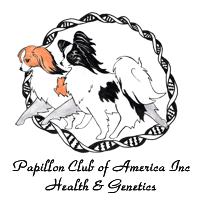
TYPE ONE IN PAPILLONS - PRA1
Identification of gene mutation makes screening possible !!!
Dr. Simon Petersen-Jones and his research team at the Michigan State
University College of Veterinary Medicine (MSU CVM) have worked for
several years to identify the genetic mutation(s) that cause progressive
retinal atrophy (PRA) in Papillons. Much of this research was funded by the Papillon Club of America and Papillon owners and breeders. Dr. Petersen-Jones announced in Spring 2012 that his team had discovered a gene mutation for one type of PRA in Papillons (hence, the name “PRA1”). You can now have your breeding stock tested (cheek swab, blood sample or frozen semen) to determine if they are affected, carrier, or unaffected (i.e., genetically normal/clear) for PRA1.
DNA TEST FOR PRA1 IN PAPILLONS
This test identifies PRA1-unaffected (genetically normal/clear) dogs, PRA1-carrier dogs, and PRA1-affected dogs. The DNA test is now available from six (6) veterinary genetic testing laboratories worldwide. Detailed collection and shipping instructions, forms, and other information are available on each laboratory’s website. You can learn more about these laboratories and their pricing HERE
Of those Papillons and Phalénes tested (thru June 2015), about 17% are PRA1-carriers and 1% are PRA1-affected. Over more time and with “smart breeding”, we should see an overall decrease in both carriers and affected dogs. Eventually, with planned "smart" breeding, the PRA1 genetic mutation will be eliminated from
SHARE YOUR PRA1 RESULTS WITH FELLOW BREEDERS :
DNA testing our breeding stock is the first, and most important step we all need to take. Sharing those results is another key step towards our goal to eradicate PRA1 from our Papillon and Phaléne gene pool! Our goal should be two-fold: 1) know the status of our own breeding stock and use that information wisely going forward and 2) promote responsible breeding for the improved health of our Papillons and Phalénes. To see expected results for various breeding strategies,
-see : PRA1 Inheritance Chart
PROGRESSIVE RETINAL
ATROPHY
The Papillon Club of America (PCA)
would like to make the PRA1 Results
available to all Papillon breeders.
PCA encourages you to send your results to us for publication.
When you receive your PRA1 Results report from your testing
laboratory, please send a copy, along with a signed
PCA Release form, to :
Stephanie Koeniger,
Member PCA Genetics Research Committee
PO Box 100327, Anchorage AK
99510-0327
You can download the Message/Release form : HERE
PCA will publish the submitted PRA1 Results on this Genetics website quarterly (similar to the CHIC listing already on this site).
The PRA1 Results lists are posted by year and each is searchable by name (partial or full), registration number, or any other character string. With PRA1 Results being publicly available, breeders can make better informed decisions for their breeding programs - definitely a "good thing" for the Papillon breed!
IMPORTANT POINTS TO REMEMBER :
- “Don’t look back!”
Test your current breeding stock and go forward from there with “smart breeding” practices.
- It is not necessary nor is it productive to try to “place the blame” on dogs (or breeders) who might
have contributed the genetic mutation. We did not have a DNA test back then, so what’s important
is what we do going forward.
- Breeders did not intentionally breed carriers. Prior to PRA1 DNA testing, they had no way to know
whether their dog was a carrier or not.
- “Don’t throw the baby out with the bath water.” Carriers can be bred! Breed a Carrier dog to
a genetically Normal/Clear dog and test the offspring. Statistically, such a breeding has a 50%
chance of producing Normal/Clear dogs.
- There is good news: DNA testing assures you that you need never produce a PRA1-Affected dog!
- By DNA testing and sharing our results, we can eliminate the PRA1 genetic mutation from our
Papillons in just a few generations!

While Papillons are generally a healthy breed, there are known genetic problems that affect
some individuals.
The goal of this Committee is to enlighten the breeding community and the general
public about the types of problems that can occur, in the hopes we can all work
together to reduce their incidence.
PCA Health & Genetic Committee
